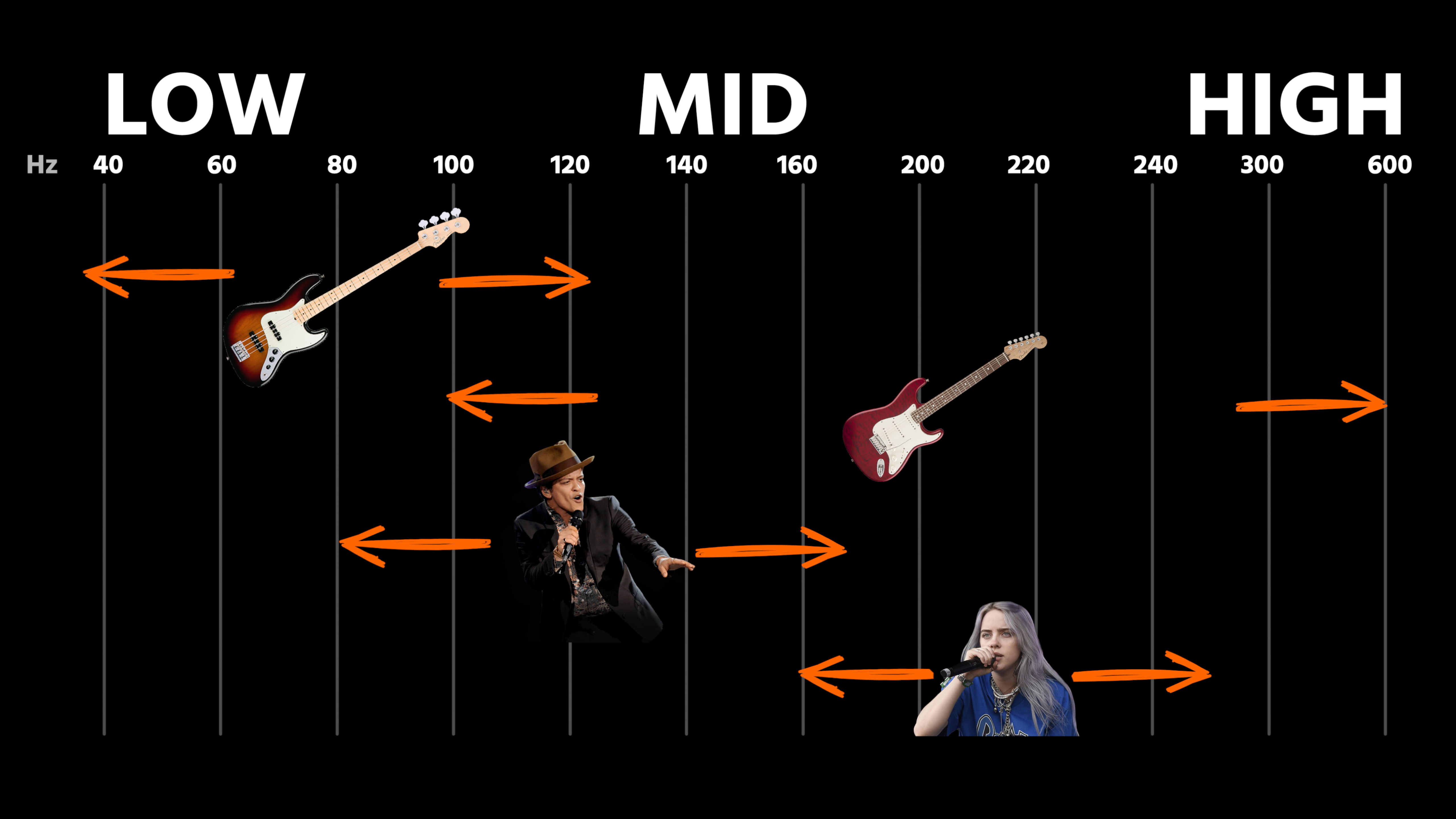Are you wondering whether picking up the bass is easier than learning the guitar? You’re not alone.
Many beginners face this exact question when deciding which instrument to start with. The good news is, both have their own sets of challenges and rewards—but understanding the differences can help you find the right fit for your musical journey.
You’ll discover why bass might feel simpler at first, what makes guitar trickier in the beginning, and the hidden challenges that come with mastering each. By the end, you’ll have a clearer idea of which instrument matches your goals and style. Ready to find out if bass is really easier than guitar? Let’s dive in.
Bass Basics
The bass guitar is a unique instrument. It shapes the sound and feel of many music styles. Understanding the basics helps to see if bass is easier than guitar.
Bass players usually support the rhythm and harmony. The instrument has distinct features that make it different from the guitar. These features affect how beginners learn and play bass.
Fewer Strings And Simplicity
Bass guitars mostly have four strings. Guitars usually have six strings. Fewer strings mean fewer notes to learn at first.
This reduces the initial challenge of finger placement. Players can focus on playing clean notes. The simpler layout helps beginners move faster.
Single Note Playing
Bass parts mostly use single notes. Guitar often requires playing chords with multiple notes. This makes bass easier to pick up for many beginners.
Playing single notes helps players learn finger strength and timing. It also allows a quick sense of progress. Learning to play melodies on bass comes naturally.
Rhythm And Groove Focus
Bass players work closely with drums to create rhythm. The focus is on groove and timing rather than fast solos. This helps beginners develop a strong musical foundation.
Learning to lock in with the beat makes playing more enjoyable. It builds confidence and keeps music tight. The rhythm focus makes bass accessible to new players.

Credit: scottsbasslessons.com
Guitar Challenges
Playing the guitar comes with its own set of challenges. Many new players find the guitar harder to learn than bass. This is due to the complexity of chords, finger movements, and control needed. Understanding these guitar challenges helps explain why some people find bass easier.
Complex Chords And Finger Coordination
Guitar players must learn many chord shapes. Some chords require pressing multiple strings at once. This needs good finger coordination and precision. Switching between chords quickly can feel frustrating at first. It takes time to build muscle memory for smooth changes.
Muting Unwanted Strings
When playing guitar, unwanted string noise is common. Players need to mute strings they are not playing. This requires using parts of the hand to stop strings from ringing. Proper muting improves sound quality but can be hard to master early on. It adds another layer of control to learn.
Building Finger Strength
Guitar strings are thinner but can still be tough to press down. Beginners often struggle with finger pain and weakness. Regular practice helps build finger strength and endurance. Strong fingers make playing chords and solos easier. Without enough strength, playing for long periods becomes tiring.
Physical Effort Differences
Physical effort plays a key role in deciding if bass is easier than guitar. Both instruments demand different types of strength and finger control. Understanding these differences helps beginners choose the right instrument for them.
The physical demands can affect practice time and comfort. Some players find bass easier because of how the strings feel. Others prefer guitar for its lighter touch. Let’s explore the main factors involved.
String Thickness And Length
Bass strings are thicker and longer than guitar strings. This means they require more force to press down. The thicker strings produce deeper sounds but need stronger fingers. Guitar strings are thinner and shorter, so they feel easier to push.
The length of bass strings adds tension, making them harder to press. This can be tiring for beginners at first. Guitar strings have less tension, which helps with quick finger movements. Both instruments need practice to build finger strength over time.
Hand And Finger Strength Required
Bass players often need more hand strength because of the string thickness. Pressing the strings firmly helps avoid buzzing sounds. This can be tough for beginners but improves with regular practice. Guitar players use more finger agility for chords and fast changes.
Guitar requires more finger independence and dexterity. Bass focuses on steady pressure and rhythm. Both require hand endurance but in different ways. Beginners should expect some finger soreness at the start of learning either instrument.
Advanced Skills On Bass
Advanced skills on bass take the instrument beyond simple note playing. These techniques add flair and complexity to your sound. They also demand precision and practice. Exploring these skills shows why bass is not always easier than guitar.
Slapping, Popping, And Tapping
Slapping uses the thumb to strike the strings, creating a sharp, percussive sound. Popping follows by pulling the string with fingers to snap it back. These two together create a rhythmic, funky tone. Tapping means using both hands on the fretboard to play notes. This technique allows fast, smooth runs and melodic lines. These skills require coordination and timing. They also give bass players a unique voice in any band.
Developing Rhythmic Mastery
Bass players must lock in tightly with the drums. This connection forms the groove of the music. Advanced players develop a strong sense of timing and rhythm. They learn to feel the beat deeply and anticipate changes. Rhythmic mastery helps bass lines drive the song forward. It also supports other instruments and singers. This skill is just as important as technical playing. It separates good bassists from great ones.
Progression And Mastery
Progression and mastery in learning bass or guitar follow different paths. Both require practice and patience. Each instrument challenges players uniquely as they advance.
Increasing Difficulty Over Time
Starting bass is often simpler. Players learn to play single notes and follow rhythms. This builds a strong foundation quickly. Guitar players face more complex chords and finger placements early on.
As skills grow, difficulty rises for both instruments. Bassists explore faster lines and complex rhythms. Guitarists tackle solos, fingerpicking, and chord variations. Progress demands more coordination and precision.
Practice time increases to improve speed and accuracy. Muscle memory develops for smooth transitions. Both instruments require focus to progress beyond basics.
Unique Challenges Of Each Instrument
Bass has thicker strings. This demands finger strength and endurance. Holding longer notes while locking with drums is key. Playing with timing and groove shapes bass mastery.
Guitar involves more finger movement. Chords and scales require flexibility and speed. Soloing needs strong note control and expression. Coordination between both hands is essential.
Both instruments test musical understanding. Reading music, rhythm, and ear training are vital. Each path offers distinct hurdles that shape a musician’s skill.

Credit: forum.bassbuzz.com
Choosing Based On Preference
Choosing between bass and guitar depends heavily on personal preference. Both instruments offer unique experiences that suit different tastes and goals. Understanding what appeals to you helps make the right choice.
Consider what kind of sound and style excite you. Think about your motivation and what you want to achieve with the instrument. These factors guide your decision more than perceived difficulty.
Sound And Style Considerations
Bass produces deep, low tones that support the rhythm section. It creates a strong foundation in many music styles like rock, jazz, and funk. Guitar offers a wider range of sounds, from soft melodies to powerful riffs.
Guitar suits lead roles and solos, appealing to those who want to stand out. Bass fits players who enjoy supporting the band and driving the groove. Your style preference helps decide which instrument fits your music taste.
Personal Motivation And Goals
Think about why you want to play music. Desire to write songs, perform solos, or play in a band shapes your choice. If you want to focus on rhythm and teamwork, bass is a good fit.
If you dream of playing melodies and complex chords, guitar may be better. Motivation to practice regularly affects your progress. Pick the instrument that keeps you excited and motivated to learn.

Credit: www.reddit.com
Frequently Asked Questions
Which Is Easier To Learn, Bass Or Guitar?
Bass is generally easier to start due to fewer strings and simpler single-note lines. Guitar demands more complex chords and finger coordination. Both require practice, but bass focuses on rhythm, while guitar involves more technical skill initially. Mastery of either takes time and dedication.
Can A Guitarist Easily Play Bass?
A guitarist can play bass more easily due to fewer strings and simpler single-note lines. Bass focuses on rhythm, but demands physical strength and groove mastery. Both instruments require different skills and practice to master.
Is Bass The Easiest Instrument?
Bass is often easier to start due to fewer strings and simpler single-note lines. It focuses on rhythm and timing. However, mastering bass requires physical strength and groove skills. Both bass and guitar have unique challenges, making neither instrument truly easiest overall.
Should I Start Bass Or Guitar First?
Start with bass for simpler rhythms and fewer strings, making it easier initially. Guitar demands complex chords and finger coordination, which can be tougher at first. Choose bass to build timing or guitar for melodic versatility; both require dedication to master.
Conclusion
Choosing between bass and guitar depends on personal interest and goals. Bass offers a simpler start with fewer strings and single-note focus. Guitar involves more complex chords and finger techniques from the beginning. Both instruments need practice and patience to improve skills.
Playing either one can be rewarding with consistent effort. Your choice should match what sounds and styles you enjoy. Remember, no instrument is truly easy; each has its own challenges. Keep practicing, and enjoy making music your way.

Senior Music Reviewer
Alex Carter is a seasoned music reviewer with over a decade of experience in the world of sound and instruments. Passionate about helping musicians and enthusiasts make informed choices, he brings sharp insights and in-depth knowledge to every review. From classical instruments to modern gear, Alex combines technical expertise with a love for music to deliver content that resonates with readers.
As a Senior Music Reviewer and expert author on Tuneluma.com, Alex is dedicated to sharing honest evaluations, practical advice, and thoughtful commentary to guide readers in their musical journey.


Leave a Reply